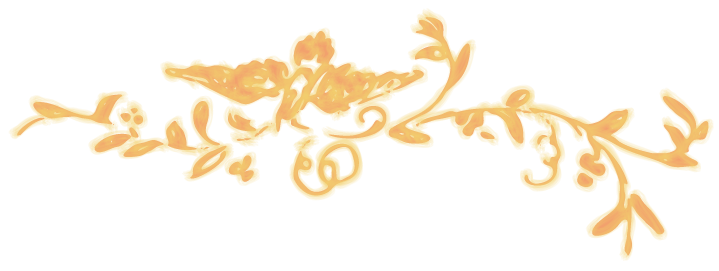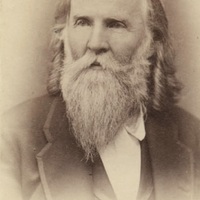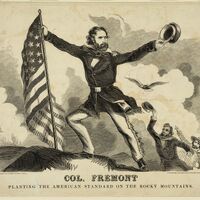Night by Lake Tlamath, A
When snows have fled from the breath of Spring,
And the rushing floods leap swollen on —
As a jewel set in a mountain ring,
On the hand of the Giant Oregon —
Or a star in the dusky night of pines,
That bright in the sombre foliage shines —
Or a lover's eye that clear, between
Dark lash and heavy brow, is seen —
The Tlamath Lake lies beautiful,
In the heart of its mighty hills and woods,
Glassing them well in its waveless lull,
Or making the mountains, like their floods,
To leap and quiver, in fields below,
When its mirror moves with a waving flow,
As odorous winds from the forest blow.
But when the red autumnal sun
Rolls over the mountains in a veil
Of purpling mist, that seems to trail
On the piney slope of each mighty sheaf
In that great Harvest Field begun
Among the hills; when a mellow wail —
As of young love's delicious grief,
Or the harp of sorrow, struck with one
Prelusive note — begins to run
Through the red arcades of pine, before
The harsher blasts of the winter pour —
The waves that roll on the Tlamath Lake
Are emerald billows of flowing grass;
The stag of the hills may come to slake
His thirst in the river, whose waters break
The green expanse, with their fluid glass,
But the smoke of the Indian's doméd tent
Goes up from the smooth savannah's breast,
As over its sheet of waters went
The morning mist, when June had kissed
Their ripples awake with her sweet Southwest.
Lake Tlamath lay like a bridge of light,
That spanned a fathomless gulf below,
When the May Moon on its weltering night
Dissolved, in a silver overflow,
And adown the pines in flakes of white
On the tents of the voyageurs shook its snow.
No paddle disturbed the silent wave;
No sound was out in the silent air,
Save only the whispering tongues that gave
A weird, low murmur, everywhere,
A secret that no soul divines —
The mystery of the midnight pines!
And save withal the flames' low mutter,
That seemed as if in vain they strove
Unutterable things to utter.
Of the deeps below and the heavens above.
The Indian of the Tlamath Lake
Is fierce as savage foe may be,
Remorseless as the wolves that break
The corral's hedge, for their famine's sake,
When the herdsman, standing broad awake.
And the rifle's leveled bead, they see —
And treacherous as the wily cat —
That spotless Tiger of the West,
So smooth in her black and shining vest,
So still, through the long reeds gliding flat,
Till she darts on her helpless victim’s breast!
His arrows are tipped with English steel,
Barbed and keen, on a feathered shaft —
And bound to his wrist, by its polished haft,
Is an English half-axe hung, to deal
The nearer blow, when, hand to hand
And foot to foot, the foemen stand
In the deadly last appeal.
But the Tlamath's trail is far away
From their silvery lake and mountain pines,
To the hostile south in a fierce foray,
Or northward with their spears,
Watching the shoals where the salmon shines
By the steep Cascades, that whiten the line
Of their nursing hills, like banners waved
From feudal towers, for a people saved
In the olden lands and years.
Thus silence reigned in the weary camp,
Unjarred by the slow and measured tramp
Of the wakeful sentinel;
For the voyageurs all were folded deep,
In the downy bosom of toil-won sleep.
And the soldiers slumbered well.
Fleet couriers from the sunrise land,
They had brought to the Chief of the mountain band,
Over trackless wilds of steep and glen,
Through the deadly haunts of savage men,
Sweet words of Home; how doubly sweet
In the depths of an utter solitude,
Where the stealthy glide of the Indian's feet,
Is the only human tread they meet,
And that is blood-imbrued.
And came withal a whispered call
To turn him back, for a day of need —
To the golden south, where his gauntlet fell
At Castro's coward foot so well—
With a whip in the hand of his eager band
To scourge the wretch for his miscreant deed,
When the Hour should strike its bell;
And sooth, his steed would make good speed
With that buoyant hope in sell.
Not yet the Leader gave his hand
To the beckoning hand of sweet Repose,
With her, dreams of home in a sunny land,
Beyond the whoop of savage foes.
With a slow and cautious tread, he went,
Between the camp-fires and the dark,
Where the flickering flames, far outward, sent
The huge pine shadows, reeling and bent.
Like wrestling giants, grim and stark;
And he saw them leap from tent to tent,
With their ghostly arms flung up in air,
As if their frenzied play were meant
To warn him back from a peril there,
Or so to find some silent vent
For a great and dumb despair.
All round the Camp his ear and eye
Caught every motion, and every sound;
The whispering flames, and the solemn sigh
Of the pine-tops, where the winds went by
In their everlasting round;
The creeping stir of the bristling leaves
Where a breath would dance their quivery sheaves,
The moan of the waters that came to break
On the reedy marge of the Moonéd Lake,
And a low, faint murmur, everywhere
From the deeps of pine to the Tlamath's verge,
As if the spirits who hovered there,
Were singing, to a love-lorn air,
The prelude of a solemn dirge !
Such fancies are feeble to awe the brave;
He heeds no murmur of wood or wave
Who trembles not at a war-whoop's yell —
The silence of the untrodden wild,
And the trust of nature's simple child —
The steed, quick-eared— who is prompt to tell
The lurking of foes — said, "All is well!"
Calm in assurance the Leader went
And sat at the door of his open tent.
In the light of the whispering flames;
And over the page in silence bent,
That bore his treasured Names —
And whose simple words had power to roll
The broad expanse, with its mountain chains.
And deserts and woods and endless plains,
Together, like their pictured scroll,
Bringing the utmost zones to meet
In a kiss of unity long and sweet.
What waking visions softly came
Between him and the mystic flame,
That changed the deeps of the forest gloom,
To a twilight nook in a curtained room,
The heavy breaths of his sleeping band
To the ripples of Childhood's sweet repose —
The soft wind's touch to a gentle hand,
On his forehead pressed, in a far-off land.
And its sound to a music he only knows —
While over his head the holy stars,
Looking down through the pine trees' moving bars,
Became such eyes! Ah me! to guess
Were to touch too near the sacred veil ;
Or how, with a growing vividness,
The visions shone as the fires grew pale,
Stealing away into dreams of sleep.
The same, but ever more clear and deep;
Till camp, and mountain, and Tlamath vale,
Were things involved in a distant clime,
And the purple mist of a vanished time.
Hark! was it not a falling blow
In the dusky verge of the sleeping camp?
Look! are they only the shadows, that go
Along the pine-bolls, crouching low,
In the pale fire's dying lamp?
And that the moan of the breeze? Ah, no!
That stifled moan is a dying groan,
Where the hand of the traitors fell!
"To your rifles! ho! 'tis the savage foe!"
To their feet they sprang, and the forest rang
With a long unearthly yell,
And the sudden twang of the deadly bow —
And the rifle's crack, quick answering back,
That laid the foremost Tlamath low !
A moment now, for death or life.
The pine-woods blazed with the quick, hot strife
Of barbéd arrow and whizzing ball;
The Delawares plied the scalping-knife
Wherever a foe might fall,
And the Tlaniath's scalp was whirled on high,
With a leap, and a fierce exulting cry,
And such a glare in the burning eye,
As looks but to appall !
The Tlamaths gave one parting yell,
One arrowy shower, and fled,
And left behind them, where he fell,
Their boldest warrior, dead —
A royal chieftain, strong and young,
Whose polished arrows, and plumage red,
And cap with glittering jewels strung,
Bespoke the flower of their savage band,
Of the subtlest brain, and the firmest hand,
A warrior proud and dread.
Alas! too well in the silent dark
The red axe struck to its sleeping mark;
Young Basil the gallant, the loved and fair —
A sinewy Sioux swift and stark,
And a bold broad-breasted Delaware —
Lay bleeding and warm, but lifeless there,
But dear to their souls was the red cup poured
With another dawn, on the Tlamath horde,
When the hungry fire, and the rifle's shot,
Lapped up their homes to a blackened spot,
And mowed their swarms like the falling grain,
When the reapers bow to the harvest plain —
Till their treacherous powder, with their warriors slain,
Fell shattered and was not.
- Title
- Night by Lake Tlamath, A
- Alternative Title
- When snows have fled from the breath of spring
- Date
- 1856
- Bibliographic Citation
- Signal Fires on the Trail of the Pathfinder, New York: Dayton and Burdick, 1856, 78-87.
- note
- Tlamath is an older transliteration of the now more commonly-used Klamath.
- This is another one of the poems in this regrettable collection that shows George S. Burleigh capitulating to racist discourses and dismissals of Native peoples, as well as celebrating warfare and imperial expansion. The final stanza about the massacre in the Klamath village is the worst thing I have seen, morally, from the pen of George S. Burleigh.
- This poem commemorates what is now seen as a horrific example of the genocide that would be conducted against the Native peoples of Klamath Basin in Oregon and California. Article below.
- 1846 Fremont and Kit Carson at Klamath Lake
- Related resource
-
 Basil Lajeunesse
Basil Lajeunesse
- Media
-
 A Night by Lake Tlamath
A Night by Lake Tlamath




